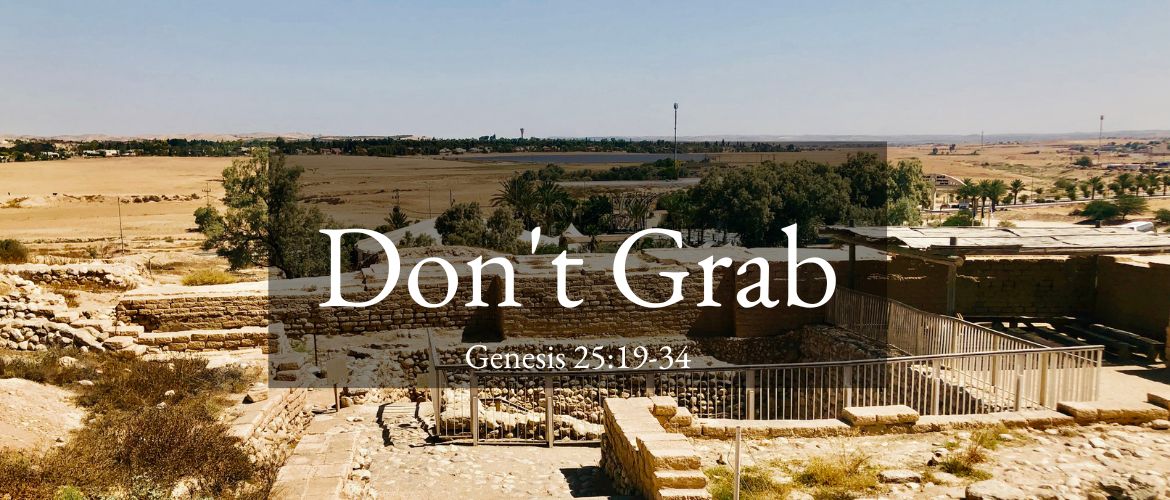
讲员:杨全荣
亲爱的弟兄姐妹,现在我们就直接进入神的话语中,请打开创世记1:1。
创1:1起初,神创造天地
再打开诗篇19:1-2
19:1 诸天述说神的荣耀.穹苍传扬他的手段。
19:2 这日到那日发出言语.这夜到那夜传出知识。
我们低头祷告:
伟大的主,创造宇宙万物的真神,我们感谢你,你是伟大的神,你居然降世为人,为了我们这些从泥土中所造的罪人,你拯救了我们。主啊,我们感谢你,因着我们认识了你,当我们仰望天空,我们看见那星宿、月亮,我们心里充满着赞美,充满了敬拜。因为诸天述说神的荣耀,穹苍传扬你的手段,你说有就有,你命立就立。主你的话语,充满着能力。主我们也祈求你的话说在我们的心里,让我们更多的认识你,让我们的生命更多的被你改变,被模成你儿子的形象,奉主耶稣基督的名祷告,阿们。… Read the rest

人类堕落的四部曲
第一次的堕落─受蛇诱惑而吃分别善恶树的果子(三1~6)
第二次的堕落─人意的敬拜,因嫉妒而杀弟兄,远离神的面,发明无神的文化以求自存、自娱、自卫(四1~24)
第三次的堕落─神的儿子和人的女子结合,人在地上罪恶很大,终日所思想的尽都是恶(六1~5)
第四次的堕落─人联合起来背叛神,用砖当石头,建造巴别塔,传扬自己的名(十一1~9)
亚伯拉罕、以撒、雅各的神
一、亚伯拉罕的神──认识神是父神──我自己不能作甚麽,一切都在乎神;祂是父,祂是一切的起头,一切都得出于神
二、以撒的神──认识基督是子神──神的一切都是在基督里作成的,我们也惟有在基督里才能承受神的一切
三、雅各的神──认识圣灵是灵神──神在圣灵里对付我们天然的生命,也将基督的生命组织在我们里面
创世记中的主要地方
… Read the rest
主题
创世记开始于生命和光,结束于死亡和黑暗;表明人因着堕落犯罪,结局乃是死亡和黑暗,因此人需要神的救赎。没有救赎的人生,乃是『收殓在棺材里,停在埃及』的人生。所以创世记以后还有出埃及记,神继续作工。
分段
- 荣耀的葬礼:约瑟为雅各哀苦,并将他葬在麦比拉洞(1~14节)
- 真情的挚爱:哥哥们对约瑟的怀疑与约瑟的爱的对比(15~21节)
- 约瑟的遗言:信靠神的应许(22~26节)
荣耀的葬礼:约瑟为雅各哀苦,并将他葬在麦比拉洞(1~14节)
- 约瑟伏在他父亲的面上哀哭,与他亲嘴:应验了神对雅各的应许(1)
- 约瑟是一个信守诺言,尽力达成对父亲的承若(2-3)
- 约瑟毫无难处的得到法老的支持去迦南埋葬父亲:约瑟的见证的果子(4-6)

主题
- 从雅各与约瑟的对话认识雅各与神的关系
- 从雅各祝福以法莲和玛拿西这事认识他属灵眼睛的明亮
分段
- 病重的雅各认领约瑟二子作自己的儿子(1~7节)
- 雅各要给约瑟的两个儿子祝福,立以法莲在玛拿西之上(8~20节)
- 将死的雅各告诉约瑟神必与以色列人同在,把他们领会列祖之地(21~22节)
生命信息
- 你父亲病了:孝顺的约瑟(1)(出 20:12,弗

主题
- 从雅各祝福法老认识神工作的结果
- 从约瑟对家人的照顾认识基督徒对家人的责任
- 从约瑟的服事认识基督徒该有的品格
- 从雅各的遗嘱认识雅各心里的盼望
分段
- 约瑟的哥哥和父亲与法老相见(1~10)
- 约瑟对家人的照顾(11~12)
- 约瑟把粮食所得的都归给法老(13~26)
- 雅各的遗嘱:葬在列祖被埋葬的地方(27~31节)

主题
- 从雅各去别是巴献祭认识成熟的生命是不只顾自己的需要,而是常想到神的旨意。
- 从约瑟和雅各重逢认识天父与基督之间的爱
分段
- 以色列到别是巴献祭,神向他显现(1~4节)
- 全家来到埃及(5~7节)
- 随雅各下埃及的名谱(8~27节)
- 约瑟到歌珊地拜见老父,授意求法老准住歌珊地(28~34节)
生命信息
- 别是巴的历史(1)

主题
约瑟认识他一生的经历,乃是出于神美意的安排,为要成为祂最终的计划
分段
- 约瑟和弟兄们相认并向他们说安慰的话(1~15节)
- 法老吩咐迎接全家搬来埃及(16~20节)
- 发兄弟携带礼物并车辆回迦南地迎接老父(21~24节)
- 以色列答应去见约瑟一面(25~28节)
生命信息
- 看见哥哥们悔改而情不自禁(1)
- 我们经理主的管教时需要忍耐,其实更忍耐的是主自己

主题
本章记载了约瑟试验哥哥们是怎样彼此相待,在被试炼的过程,我们看见哥哥们彼此相爱,特别是犹大生命的改变。约瑟豫表基督,约瑟如何试炼哥哥们,主耶稣也如何试炼我们,让我们在试炼中,学习信心和爱心的功课,顺服主的吩咐,彼此相爱。
分段
- 约瑟为试炼哥哥暗放银杯在便雅悯的口袋里(1~12节)
- 以犹大为首的哥哥一致愿意和弟弟一同作奴仆一同担当弟弟的罪(13~17节)
- 犹大体贴父亲的心肠,愿意以自己代替便雅悯作奴仆向约瑟代求(18~34节)
生命信息
- 主的心意是要把灵粮充满我们:把粮食装满这些人的口袋(1)
- 主耶稣赐将生命的粮给犹太人和外邦人
- 约瑟有足够的粮食供应给给所有来带他面前的人

主题
- 第二次缺粮让雅各学习不再抓住便雅悯,把他交托给全能的神
- 从约瑟第二次接待哥哥们认识和经历主耶稣的爱、恩典和供应
分段
- 在迦南
- 雅各遣众子再往埃及籴粮(1~2节)
- 犹大说服雅各让便雅悯与他们同去(3~15节)
- 在埃及
- 约瑟吩咐家宰豫备筵席(16~25节)
- 兄弟们俯伏向约瑟下拜(26~28节)

主题
- 神以无限恩慈,藉着环境和约瑟叫哥哥们认罪悔改
分段
- 雅各差遣十子赴埃及籴粮(1~5节)
- 约瑟的十个哥哥向他下拜,却不认得他(6~8节)
- 约瑟将他们下在监里三天(9~17节)
- 约瑟留西缅作人质,释放其余九个哥哥(18~25节)
- 他们九人回到迦南地向父亲雅各报告遭遇的情形(26~34节)
- 雅各不容他们携幼子便雅悯去埃及(35~38节)
生命信息
… Read the rest
分段
- 法老同夜作两梦,无人能解(1~8节)
- 酒政举荐约瑟(9~13节)
- 法老召见约瑟并向他重述两梦(14~24节)
- 约瑟为法老解梦并建议因应之道(25~36节)
- 法老任命约瑟治理埃及并赐给他妻子(37~45节)
- 约瑟在七个丰年内积存粮食,又生两子(46~52节)
- 七个荒年随之来到,埃及一带地方大闹饥荒(53~57节)
生命信息
- 过了两年(1):忍耐到底,必然得救(太十22),在患难中要忍耐(罗十二12)

分段
- 酒政和膳长因故下监,约瑟伺候他们(1~4节)
- 酒政和膳长同夜各作一梦,翌晨被约瑟察知有异(5~8节)
- 约瑟为酒政解梦,并求其出监后记念他无辜被囚(9~15节)
- 约瑟为膳长解梦(16~19节)
- 二人遭遇全如约瑟所解,但酒政却忘了约瑟(20~23节)
生命信息
- 约瑟的见证:得胜者的生命
- 自己身受苦难(被囚),却仍服事同受苦难的人(4节):约瑟便伺候他们
- 对别人关心,设法了解别人的疾苦(6~7节):今日为甚么面带愁容呢?

分段
- 约瑟在护卫长波提乏家作家宰,凡事蒙神赐福(1~6节)
- 波提乏的妻子色诱约瑟,但遭约瑟拒绝(7~12节)
- 波提乏的妻子恼羞成怒,诬赖约瑟(13~18节)
- 约瑟因此被下在监里,但神向他施恩(19~23节)
生命信息
- 三十七章出现了约瑟的第一个和第二个梦:他将会作王
- 结果却是彩衣变成血衣;从爱子变成奴仆(可十45)
- 神纪念和亚伯拉罕的约(诗105:7~11)
- 所以神先打发约瑟去:以奴仆的形式(诗105:16~17)

分段
- 犹大娶迦南女子为妻,生三个儿子(1~5节)
- 长、次两子死于作恶受罚,犹大将儿媳送回娘家(6~11节)
- 因犹大不守诺言,媳妇他玛装作妓女与犹大同寝(12~23节)
- 他玛从犹大怀孕生法勒斯和谢拉(24~30节)
生命信息
- 犹大
- 犹大不义的品行,这跟约瑟的敬虔成了强烈的对比。
- 离开他弟兄下去(1):信徒一离开弟兄和教会,定规走属灵的下坡路,就会堕落到世界里去

分段
- 被哥哥们恨恶:
- 因他报告哥哥们的恶行(1~2节)
- 因他的父亲偏爱他(3~4节)
- 因他告诉他们他将作王管辖他们的梦(5~11节)
- 被哥哥们所害:
- 他奉父命往哥哥们处表达关怀之意(12~17节)
- 哥哥们同谋害他将他丢在坑里(18~24节)
- 哥哥改变主意,将他卖给以实玛利人(25~28节)
- 雅各受骗,相信约瑟被野兽撕碎了(29~35节)

分段
- 以扫的三个妻子(1~5节):亚大,阿何利巴玛,巴实抹
- 以扫离开迦南迁往西珥山(6~8节)
- 以扫的众子(9~14节)
- 以扫所出的族长(15~19节)
- 西珥地的原住民何利人(20~30节)
- 以东地的诸王(31~39节)
- 以扫所出的族长(40~43节)
从以扫的家谱看肉体的特征
- 以扫就是以东(1,8,19节)

前言
- 三十五章是雅各第三段人生的最后阶段:
- 更多的认识神的旨意和经历神的破碎,迈向成熟的属灵生命
生命信息
- 示剑的功课后神再次呼召雅各去住在伯特利(1节)
- 神呼召雅各起来,上伯特利,住在那里(1)
- 神不会忘记我们与神的经历(1)
- 雅各顺从神,带领家人除掉偶像、自洁、更换衣裳、路上被神保守(2~5节)
- 在伯特利筑了一作坛名伊利伯特利(6~7节)
- 利百加的奶母底波拉的死(8节)

分段
- 雅各的女儿底拿受辱(1~5节)
- 雅各的儿子们设下诡计(6~17节)
- 示剑说服全城的男丁受割礼(18~24节)
- 雅各的儿子们趁机杀戮全城男丁并掠夺财物妇孺(25~29节)
- 雅各因此有了臭名(30~31节)
前言
- 这一章是雅各停留在示剑的后果
- 充满人性丑陋的一章:没有一次提到神的名


